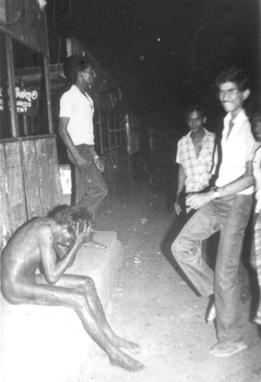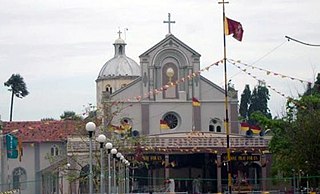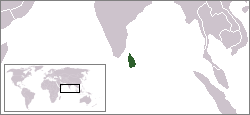| |||||
| Decades: | |||||
|---|---|---|---|---|---|
| See also: | |||||
The following lists events that happened during 1984 in Sri Lanka .
| |||||
| Decades: | |||||
|---|---|---|---|---|---|
| See also: | |||||
The following lists events that happened during 1984 in Sri Lanka .

The Liberation Tigers of Tamil Eelam was a Tamil militant organization, that was based in the northern and eastern Sri Lanka. The LTTE fought to create an independent Tamil state called Tamil Eelam in the northeast of the island in response to violent persecution and discriminatory policies against Sri Lankan Tamils by the Sinhalese-dominated Sri Lankan Government.

The Sri Lankan civil war was a civil war fought in Sri Lanka from 1983 to 2009. Beginning on 23 July 1983, it was an intermittent insurgency against the government by the Liberation Tigers of Tamil Eelam led by Velupillai Prabhakaran. The LTTE fought to create an independent Tamil state called Tamil Eelam in the north-east of the island for the Tamil Sri Lankans.

Black July was an anti-Tamil pogrom that occurred in Sri Lanka during July 1983. The pogrom was premeditated, and was finally triggered by a deadly ambush on a Sri Lankan Army patrol by the Liberation Tigers of Tamil Eelam (LTTE) on 23 July 1983, which killed 13 soldiers. Although initially orchestrated by members of the ruling UNP, the pogrom soon escalated into mass violence with significant public participation.

The Vankalai massacre was a massacre of a family of four minority Sri Lankan Tamils at the hands of the Sri Lankan military personnel from the village of Vankalai in Mannar District, Sri Lanka on June 8, 2006. The victims were tortured and the mother was gang raped before her murder.
The Expulsion of Muslims from the Northern Province of Sri Lanka was the forcible displacement of 72,000 Sri Lankan Muslims from the Northern Province carried out by the Liberation Tigers of Tamil Eelam (LTTE) in October 1990, during the Sri Lankan Civil War. Some observers describe this as an act of "ethnic cleansing". The LTTE stated that this expulsion was carried out in retaliation for Muslim participation in atrocities committed against Tamils in the Eastern Province.
The Kent and Dollar Farm massacres were the first massacres of Sinhalese civilians carried out by the LTTE during the Sri Lankan Civil War. The massacres took place on 30 November 1984, in two tiny farming villages in the Mullaitivu district in north-eastern Sri Lanka. The Sri Lankan government labeled this as an attack on civilians by the LTTE.
The Anuradhapura massacre occurred in Sri Lanka in 1985 and was carried out by the Liberation Tigers of Tamil Eelam. This was the largest massacre of Sinhalese civilians by the LTTE to date; it was also the first major operation carried out by the LTTE outside a Tamil majority area. Initially, EROS claimed responsibility for the massacre, but it later retracted the statement, and joined the PLOTE in denouncing the incident. The groups later accused the LTTE for the attack. Since then, no Tamil militant group has admitted to committing the massacre. However, state intelligence discovered that the operation was ordered by the LTTE's leader Velupillai Prabhakaran. He assigned the massacre to the LTTE Mannar commander Victor and it was executed by Victor's subordinate Anthony Kaththiar. The LTTE claimed the attack was in revenge of the 1985 Valvettiturai massacre, where the Sri Lanka Army killed 70 Tamil civilians in Prabhakaran's hometown. In 1988, the LTTE claimed that the massacre was planned and executed under the guidance of Indian intelligence agency, RAW.
The October 1995 Eastern Sri Lanka massacres were a series of massacres of the Sinhalese population in the Eastern Province or Sri Lanka carried out by the Liberation Tigers of Tamil Eelam (LTTE) during the Sri Lankan Civil War.

The 1956 anti-Tamil pogrom, also known as the Gal Oya riots, was the first organised pogrom against Sri Lankan Tamils in the Dominion of Ceylon. It began with anti-Tamil rioting in Colombo, followed by anti-Sinhalese rioting in the Batticaloa District. The worst of the violence took place in the Gal Oya valley after the Batticaloa attacks, where local majority Sinhalese colonists and employees of the Gal Oya Development Board commandeered government vehicles, dynamite and weapons and massacred minority Tamils. It is estimated that over 150 people, mostly Tamils, had died during the violence. The police and army were eventually able to bring the situation under control.
The 1985 Valvettiturai massacre happened on May 12, 1985 after 2 landmine attacks killed 10 soldiers and an officer in Valvettiturai. 70 minority Sri Lankan Tamil civilians from the town of Valvettithurai, Sri Lanka were rounded up. They were asked to go inside the town library and then the library was blown up by the Sri Lankan Army killing all of them. The LTTE would later apparently retaliate in Anuradhapura. In the ensuing weeks dozens more Tamil civilians were also killed.
The 1984 Mannar massacre was the killing of 200+ minority Sri Lankan Tamils civilians by Sri Lankan Army soldiers in the town of Mannar, north-western Sri Lanka, on December 4, 1984. The attack was triggered when three Army jeeps hit a land mine, killing one soldier. In retaliation, landmarks such as the Central hospital, the post office, a Roman Catholic convent as well as villagers working in rice paddy fields and bus passengers were attacked. Villages around Mannar town such as Murunkan and Parappankadal were also attacked. Immediately after the incident, the then Sri Lankan President J. R. Jayawardene appointed a Presidential commission of inquiry. A local Roman Catholic priest, Mary Bastian who was a member of the Presidential commission was later killed in January 1985. A Methodist minister George Jeyarajasingham, who was a witness to the incident, was also killed in December 1984.

Mannar District is one of the 25 districts of Sri Lanka, the second level administrative division of the country. The district is administered by a District Secretariat headed by a District Secretary appointed by the central government of Sri Lanka. The capital of the district is Mannar, which is located on Mannar Island.

The Cheddikulam massacre was a massacre of Sri Lankan Tamil civilians in the village of Cheddikulam, located on the border of the Vavuniya and Mannar districts. It was among the first of the series of massacres carried out by the Sri Lankan armed forces during the country's Civil War.
Terrorism in Sri Lanka has been a highly destructive phenomenon during the 20th and 21st centuries, especially so during the periods of the Sri Lankan Civil War (1983–2009) and the first (1971) and second JVP insurrections (1987–1989). A common definition of terrorism is the systematic or threatened use of violence to intimidate a population or government for political, religious, or ideological goals. Sri Lanka is a country that has experienced some of the worst known acts of modern terrorism, such as suicide bombings, massacres of civilians and assassination of political and social leaders. Terrorism has posed a significant threat to the society, economy and development of the country. The Prevention of Terrorism Act of 1978 is the legislation that provides the powers to law enforcement officers to deal with issues related to terrorism in Sri Lanka. It was first enacted as a temporary law in 1979 under the presidency of J. R. Jayewardene, and later made permanent in 1982.
The following lists events that happened during 1983 in Sri Lanka.

The 1987 Eastern Province massacres were a series of massacres of the Sinhalese population in the Eastern Province of Sri Lanka by Tamil mobs and Liberation Tigers of Tamil Eelam (LTTE) during the Sri Lankan Civil War. Though they began spontaneously, they became more organized, with the LTTE leading the violence. Over 200 Sinhalese were killed by mob and militant violence, and over 20,000 fled the Eastern Province. The violence has been described as having had the appearance of a pogrom, with the objective of removing Sinhalese from the Eastern Province.
Sexual violence against Tamils in Sri Lanka has occurred repeatedly during the country's long ethnic conflict. The first instances of rape of Tamil women by Sinhalese mobs were documented during the 1958 anti-Tamil pogrom. This continued in the 1960s with the deployment of the Sri Lankan Army in Jaffna, who were reported to have molested and occasionally raped Tamil women.